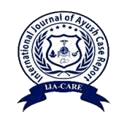Ayurvedic Management of Attention Deficit Hyperactive Disorder with Comorbid Conduct Disorder: A Case Report
Abstract
Conduct Disorder (CD) and Attention-Deficit/Hyperactivity Disorder (ADHD) are complex behavioural conditions often co-occurring in children, impacting their social and academic functioning. Conventional management of ADHD and CD often involves the use of stimulants, antidepressants and antipsychotics which in due course cause insomnia, reduced appetite, headache etc. The article explores Ayurvedic management approaches, focusing on internal administration of medicines, external procedures and lifestyle modifications that aim to address the root causes of these disorders and improve the overall well-being. This is the case of a 9-year-old girl diagnosed with Attention-Deficit/Hyperactivity Disorder (ADHD) and Conduct Disorder (CD), who underwent a one-month inpatient treatment program. The treatment such as Shodhananga snehapana, virechana and matravasthi focused on behavioural interventions, structured routines, and therapeutic support to address her symptoms including impulsivity, aggression, and defiant behaviours. Throughout her stay, her progress was monitored through both behavioural observations and clinical assessments using Conner’s ADHD rating scale. Her anger outbursts, defiance and usage of abusive words got reduced after treatment. The article highlights the challenges and successes of Ayurvedic management of dual diagnoses in children, emphasizing principles from the Unmada and the value of an integrated approach for better behaviour and emotional regulation.

